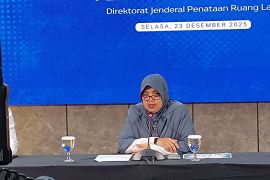The award was presented by The Nature Conservancy, World Resources Institute and WWF - three leading global environmental and conservation organizations, specifically to recognize Yudhoyono`s leadership in establishing the multilateral Coral Triangle Initiative (CTI).
The CTI programs aim to sustain significantly marine and coastal resources in six countries: Indonesia, Malaysia, Papua New Guinea, the Philippines, Solomon Islands and Timor-Leste.
Th Coral Triangle region is one of the most biologically diverse areas, home to more than 76 percent of all known coral species, 53 percent of the world`s coral reefs, and more than 37 percent of coral reef fish species.
It also has the largest area of mangrove forests in the world, and it is home to tuna and other commercial fish species.
In total, the coral reefs, mangroves, and associated natural habitats are valued at US $2.3 billion.
These resources provide jobs, food, and business opportunities for millions of people in the region.
Indonesia, as a country having an area of nearly 2 million km2 and over 247 million people, is one of the world`s mega biodiversity nations with rich forest and marine resources.
"Some leaders prioritize economic growth, others social equity, and yet others environmental protection. But Indonesia, under President Yudhoyono, is showing that smart environmental policies, smart growth policies, and smart social policies can be mutually reinforcing," said Andrew Steer, the President of World Resources Institute, adding "The world is watching and admiring this quest for a triple win."
Recognizing the importance of the (CTI) establishment, Glenn Prickett, the Chief External Affairs Officer for The Nature Conservancy, said President Yudhoyono`s call for action to address threats in this globally important region led to the start of the Coral Triangle Initiative.
"Today, CTI has given the world a tremendous opportunity to value nature and realize the tangible benefits of it by managing the marine resources in a way that builds our natural capital," he added.
Managing Director of World Wildlife Fund`s Coral Triangle Program Catherine Plume hoped that all stakeholders involved in this important initiative will redouble their sustainability efforts in the region.
In his speech when receiving The Environment Leadership Award in New York, on September 24, 2012, the Indonesian head of state said some 120 million people are dependent on CTI areas for their food security, and this has been the case for generations.
"It is where they make a living and make their way of life. And yet it is an area that is under various threats to environmental and economic sustainability. It is being overfished. Human irresponsibility has resulted in the rapid destruction of its coral reefs. Marine life cycles within it are being disrupted," Yudhoyono said.
Therefore, he believed it is critical to get the economics and the ecology right in the CTI area, and to do it in time before it is too late.
Indonesia introduced the CTI programme during the APEC Summit in Sydney, Australia, in 2007, and the CTI was recognized in the APEC Declaration.
After the APEC Summit, the country organized the World Ocean Conference in Manado in 2009, where the six CTI countries took part in this milestone event for the CTI.
The meeting issued Manado Declaration which became the basis for establishing a regional mechanism for Coral Triangle Initiative on Coral Reefs, Fisheries, and Food Security - known as CTI CFF.
In the latest CTI meeting, namely the Fourth CTI-CFF Ministerial Meeting (MM4) held in Kuala Lumpur, Malaysia, from November 22 to 26, 2012, the CTI member nations issued the Putrajaya CTI Joint-Ministerial Statement 2012, which aims to strengthen the commitment of its members in preserving corals in the Asia Pacific region.
Gellwynn Jusuf, the secretary general of the Indonesian maritime affairs and fisheries ministry, on Monday (Nov 26) said the declaration guides the CTI-CFF in achieving its objectives and aspirations.
During the meeting, the members agreed that a permanent secretariat of the CTI-CFF will be set up in Manado, North Sulawesi (Indonesia), and it will be operational by 2013.
Indonesia`s proposal to designate June 9 as the CTI Day was also accepted during the meeting. In addition, the members agreed on the establishment of common regional funds.
Among major development partners of the CTI mechanism is the Australian Government, the US Government, and the Asian Development Bank (ADB).
Two CTI programs that have been implemented in Indonesia are: Marine Protected Areas Governance (MPAG) and the Indonesia Marine and Climate Support (IMACS).
Indonesia has pledged to achieve 20 million hectares of marine protected areas across the country by 2020, in which the protection will be strictly enforced and sufficiently financed.
To date, Indonesia has achieved 13.4 million hectares of marine protected areas, considerably exceeding the target of 10 million hectares by 2010.
Earlier this November, Indonesian Maritime Affairs and Fisheries Minister Sharief Cicip Sutardjo said about half of the damaged coral reefs in Indonesia, which accounted for approximately 67 percent of the total coral reef population in the country, have been rehabilitated.
"We have carried out rehabilitation efforts in cooperation with the World Bank since five years ago, under the Coral Reef Rehabilitation and Management Program (Coremap)," he stated in Boalemo district, Gorontalo province.
Sharief said the damaged coral reefs recovered fast, adding that the rehabilitation process, however, was not easy. ***3***
(f001/A/S012)
Reporter: Fardah
Editor: Fardah Assegaf
Copyright © ANTARA 2012








